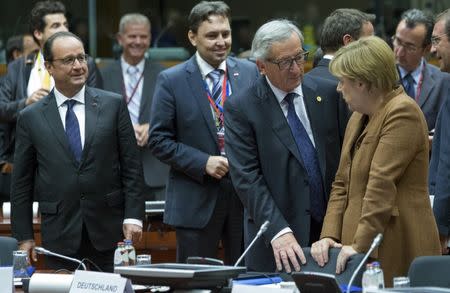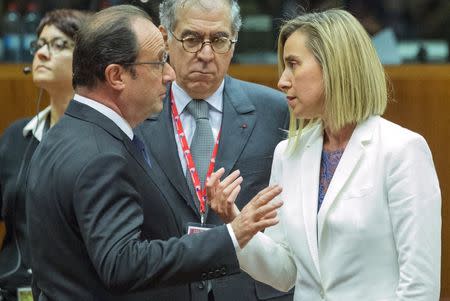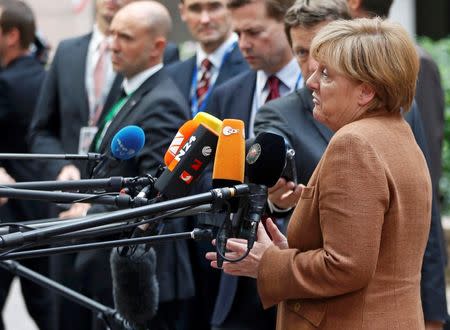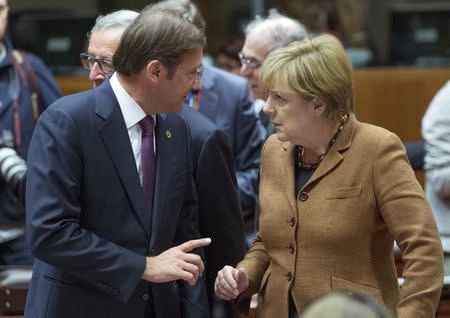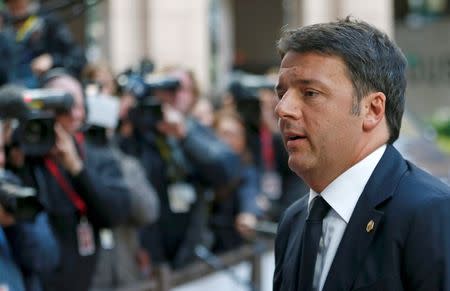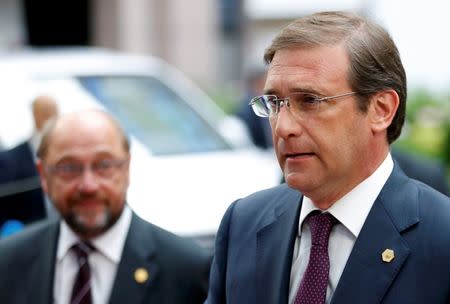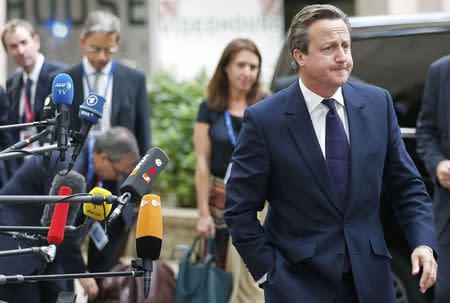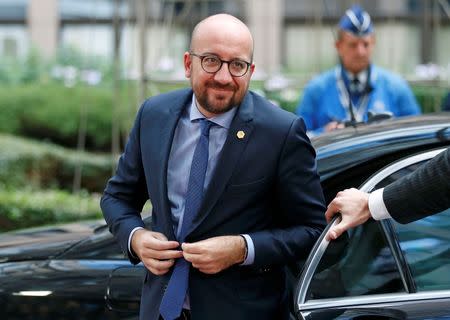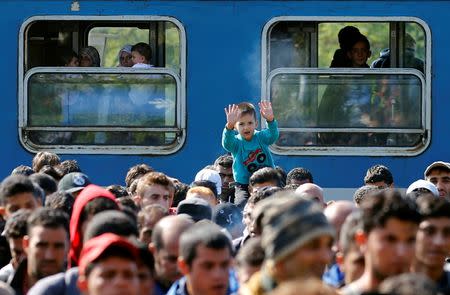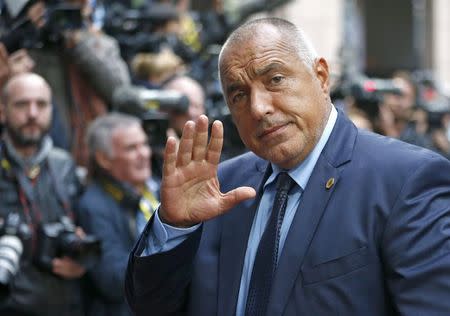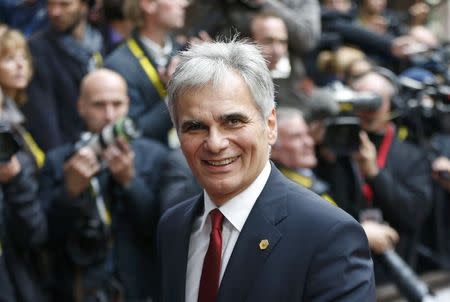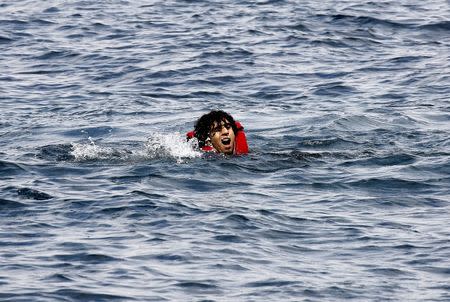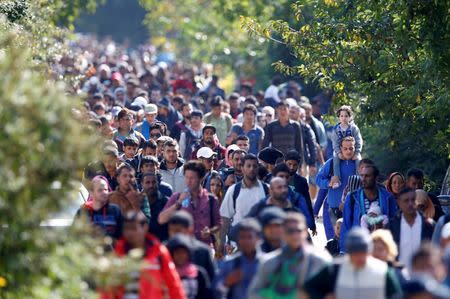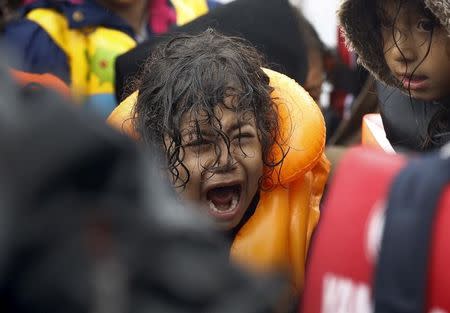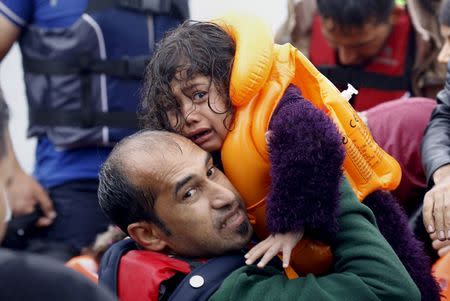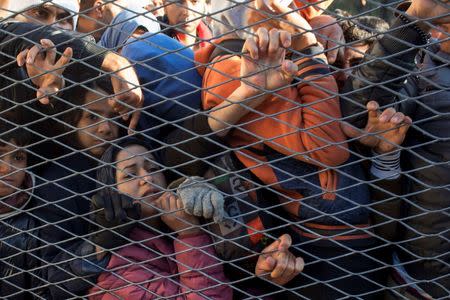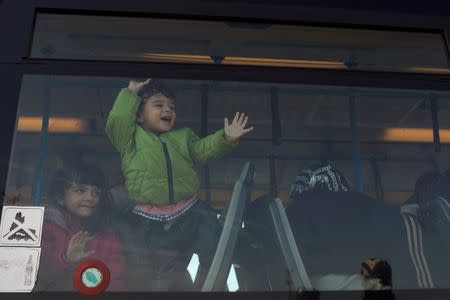EU leaders seek unity on refugee plans
By Alastair Macdonald and Philip Blenkinsop BRUSSELS (Reuters) - European Union leaders concluded a summit early on Thursday that was expected to back offers of new aid for Syrian refugees and also patch up bitter divisions over the migration crisis. Leaders will announce results of the discussions shortly. Meeting a day after their interior ministers overrode furious objections from four eastern states in a vote that will distribute asylum-seekers around the bloc according to mandatory national quotas, government leaders tried to focus on ways to curb the inflow of migrants that has hit records this summer. Feelings have been running high as chaotic crowds and varied responses from national capitals have seen borders close inside Europe's cherished passport-free Schengen zone. Many leaders are under pressure to shore up their domestic support by stressing their defense of their own national interests. "Today ... a concrete plan must finally appear in place of the arguments and the chaos we have witnessed in the last weeks," said European Council President Donald Tusk before he chaired the 28 leaders' first full EU summit in three months. Starting shortly before dinner on Wednesday, they talked for nearly seven hours in what some diplomats said was a relatively cordial atmosphere considering recent tensions. "Really good talks ... today," tweeted Estonian Prime Minister Taavi Roivas. "Some developments at early stage but EU united to find a common European solution." On a day when the Greek island of Lesbos saw 2,500 people land in dozens of dinghies from Turkey, Tusk said arrivals that already exceed half a million this year were likely to increase and that Europe must "regain control of our external borders" or risk destroying the Schengen system and the "European spirit". He forecast agreement on more help for refugees who stay in the Middle East, via funds for U.N. agencies, Turkey, Jordan, Lebanon and others. "Frontline" states like Greece and Italy should also get help on their frontiers - notably to register new arrivals and deport those who do not qualify for asylum. German Chancellor Angela Merkel, accused by some of her neighbors of fuelling the migrant influx by announcing last month that Germany would take in more Syrians, stressed on arrival that it was time for Europeans to work together. "Faced with a great challenge, it cannot be that Europe says 'We can't handle this'," Merkel said. "That's why I say again and again: We can do this." ITALY, GREECE IN FOCUS Re-elected Greek Prime Minister Alexis Tsipras and Italian Prime Minister Matteo Renzi heard calls from the north to use new EU support -- both in money and manpower -- to tighten controls on the bloc's Mediterranean frontiers. Establishing a principle of "relocating" some asylum-seekers has been a key demand of Rome in particular, which wants to end a rule that states they should remain in the first EU state they enter. Northern countries accuse Italy and Greece of undermining the Schengen area by simply letting migrants move on unchecked. Renzi said a package of EU-run relocations and deportations and EU-funded frontier forces meant Rome's partners had finally accepted demands it has been making for years to spread the load of migrant arrivals from Africa onto southern Italian islands. Hungarian Prime Minister Viktor Orban gave a robust defense of the razor-wire fencing he has erected to keep out migrants; he insisted he was only following EU rules and said that if Greece could not defend its borders, Athens should ask for help. On a visit to Germany earlier in the day, Orban accused Berlin of "moral imperialism" for encouraging Syrian refugees to try and reach the German frontier. But in Brussels he said he would not criticize Germany whom he praised as a valued partner. Orban's Slovak ally, Prime Minister Robert Fico, said he would challenge in EU courts Tuesday's rare majority-vote decision to impose quotas on states for taking in up to 120,000 asylum-seekers, mainly from Italy and Greece. "We have been refusing this nonsense from the beginning, and as a sovereign country we have the right to sue," Fico said. However, many leaders and the EU officials organizing the summit -- which will not take formal legal decisions -- are keen to put the row over "relocation" behind them for now. Collectively, national leaders may be chided by Jean-Claude Juncker, the EU's chief executive whose Commission named 19 countries for breaches of EU asylum laws: "One of the reasons why the asylum system ... isn't working is because member states do not apply it," said Juncker's deputy, Frans Timmermans. BORDER CONTROL Turkey, locked in a long love-hate relationship with Europe and through which the bulk of the summer's migrants have reached Greece, may hear promises of up to 2 billion euros to help build schools and provide for the welfare of the 2 million Syrians it has accommodated from the civil war. Johannes Hahn, who deals with the EU's neighbors as a member of the executive Commission, said on Wednesday that a trust fund established to help Syrian refugees across the region, including in Jordan and Lebanon, could reach 1 billion euros on a mix of pledges from the EU and the member states. The Commission, among proposals adopted at its weekly meeting on Wednesday, also called on them to reverse cuts in their funding for the World Food Programme. Overall, Juncker said, the EU had doubled the funds targeted to deal with migration to 9.5 billion euros ($10.6 billion). Noting plans to install "hot spots" on the Mediterranean where seconded EU officials will document arrivals and try to speed the deportation of those not qualifying for refugee status, Commission First Vice President Timmermans said: "The most urgent thing we need to do is to make sure we can fingerprint and register everyone who arrives so that we can make a distinction between those who potentially have the right to asylum and people who are migrants who don't." ($1 = 0.8985 euros) (Additional reporting by Robert-Jan Bartunek, Robin Emmott, Francesco Guarascio, Andreas Rinke, Jean-Baptiste Vey and Tom Koerkemeier; Writing by Alastair Macdonald; Editing by Tom Heneghan/Mark Heinrich)

